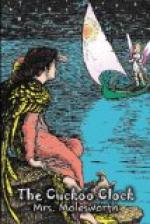For this was the case this year, after all! Spring had only been sleepy and lazy, and in such a case what could poor old winter do but fill the vacant post till she came? Why he should be so scolded and reviled for faithfully doing his best, as he often is, I really don’t know. Not that all the ill words he gets have much effect on him—he comes again just as usual, whatever we say of or to him. I suppose his feelings have long ago been frozen up, or surely before this he would have taken offence—well for us that he has not done so!
But when the spring did come at last this year, it would be impossible for me to tell you how Griselda enjoyed it. It was like new life to her as well as to the plants, and flowers, and birds, and insects. Hitherto, you see, she had been able to see very little of the outside of her aunt’s house; and charming as the inside was, the outside, I must say, was still “charminger.” There seemed no end to the little up-and-down paths and alleys, leading to rustic seats and quaint arbours; no limits to the little pine-wood, down into which led the dearest little zig-zaggy path you ever saw, all bordered with snow-drops and primroses and violets, and later on with periwinkles, and wood anemones, and those bright, starry, white flowers, whose name no two people agree about.
This wood-path was the place, I think, which Griselda loved the best. The bowling-green was certainly very delightful, and so was the terrace where the famous roses grew; but lovely as the roses were (I am speaking just now, of course, of later on in the summer, when they were all in bloom), Griselda could not enjoy them as much as the wild-flowers, for she was forbidden to gather or touch them, except with her funny round nose!
“You may scent them, my dear,” said Miss Grizzel, who was of opinion that smell was not a pretty word; “but I cannot allow anything more.”
And Griselda did “scent” them, I assure you. She burrowed her whole rosy face in the big ones; but gently, for she did not want to spoil them, both for her aunt’s sake, and because, too, she had a greater regard for flowers now that she knew the secret of how they were painted, and what a great deal of trouble the butterflies take about them.
But after a while one grows tired of “scenting” roses; and even the trying to walk straight across the bowling-green with her eyes shut, from the arbour at one side to the arbour exactly like it at the other, grew stupid, though no doubt it would have been capital fun with a companion to applaud or criticize.
So the wood-path became Griselda’s favourite haunt. As the summer grew on, she began to long more than ever for a companion—not so much for play, as for some one to play with. She had lessons, of course, just as many as in the winter; but with the long days, there seemed to come a quite unaccountable increase of play-time, and Griselda sometimes found it hang heavy on her hands. She had not seen or heard anything of the cuckoo either, save, of course, in his “official capacity” of time-teller, for a very long time.




